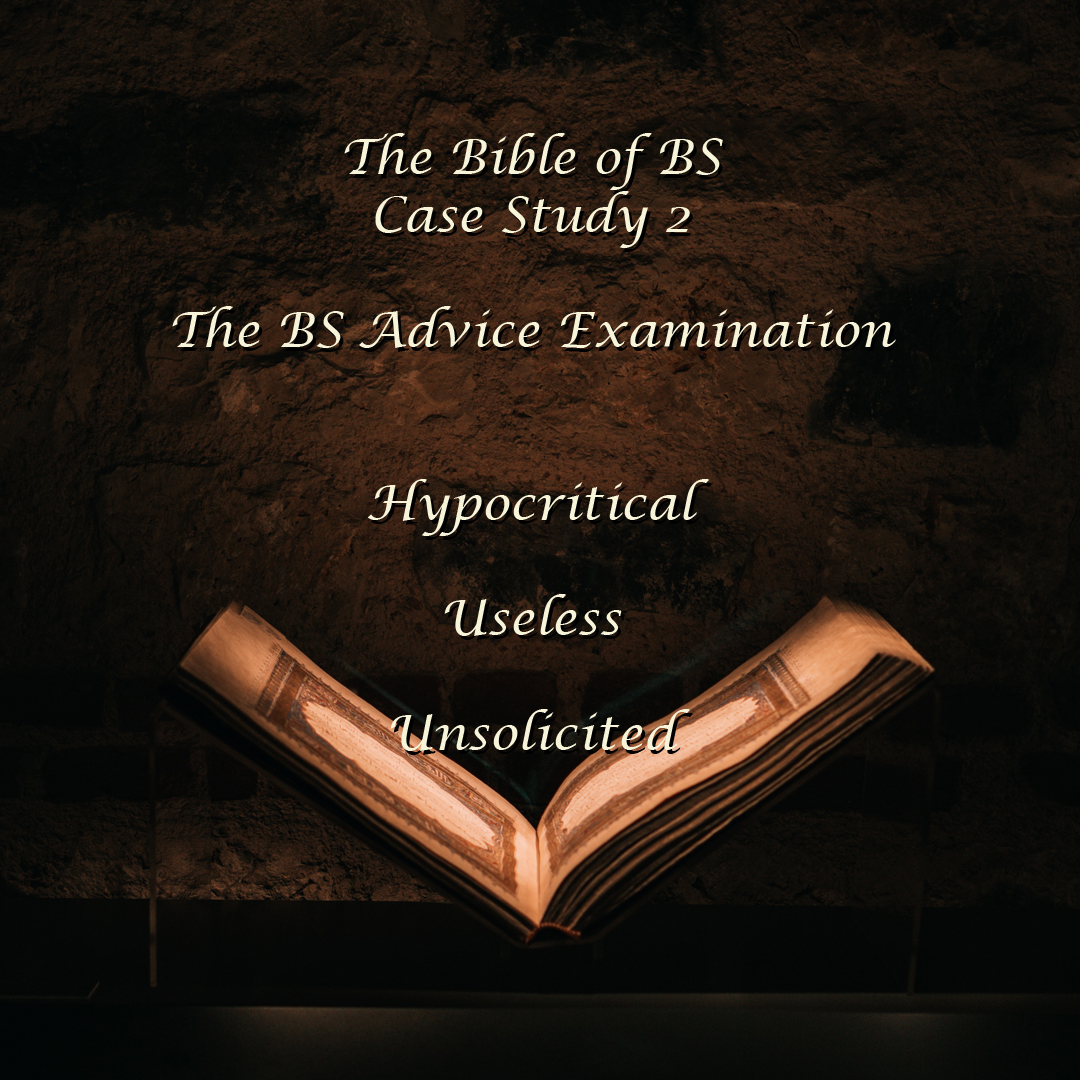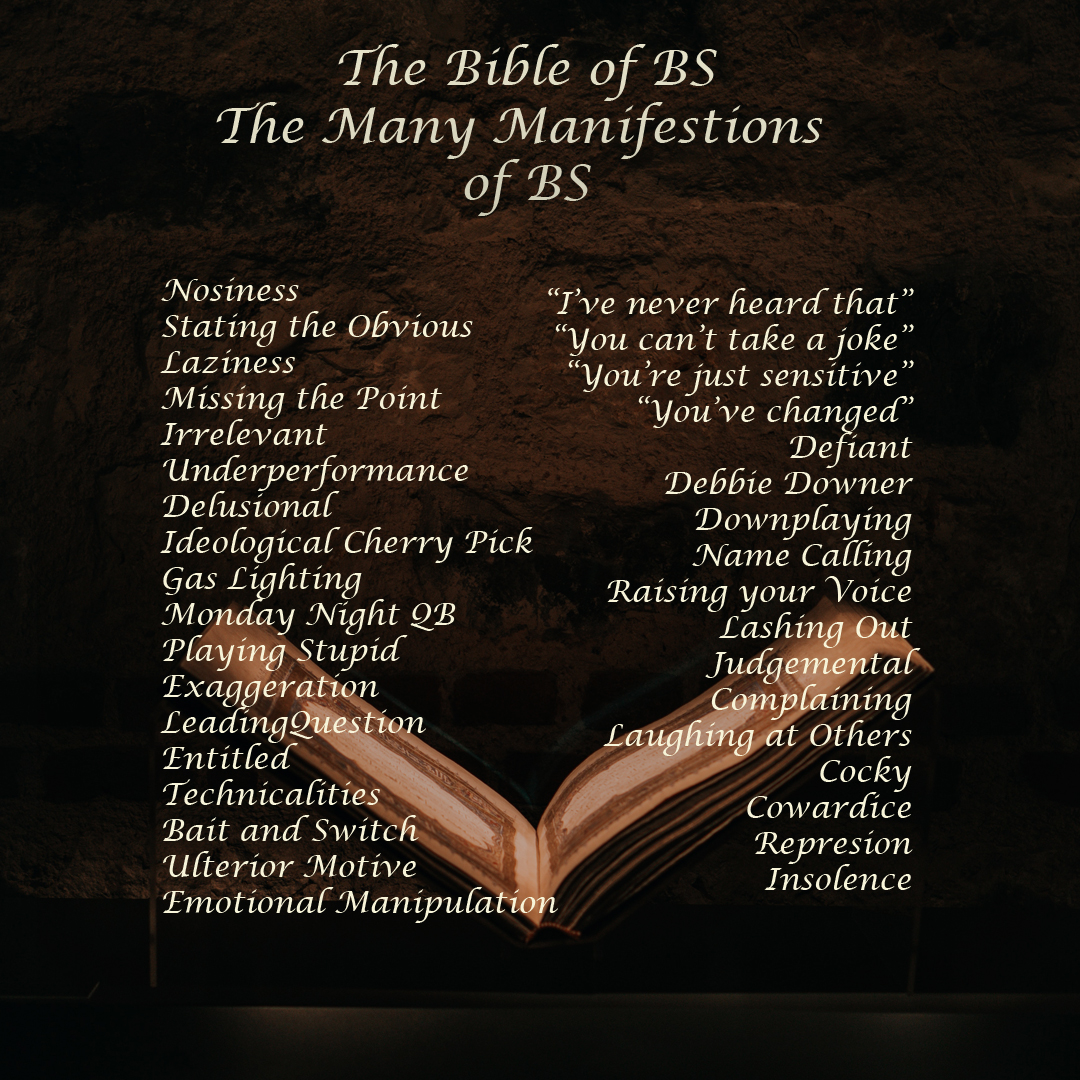-
Bible of BS Case Study

The raised eyebrow.
The flash of confusion.
The quiet alarm when someone sees things slipping outside the expected pattern—especially when you’re the one changing.
When your growth becomes the disruption, that initial “What the hell is going on?” quickly shifts into “What the hell is wrong with you?”
Most people underestimate how derailing that moment can be.
When you’re at your most vulnerable—stepping into real transformation—the look can yank you right back into your old role, the one that made everyone else comfortable.
Naturally, it’ll come from those who wish you harm. But it’ll also come from strangers, coworkers—even the ones closest to you.
Have compassion for loved ones—they may not know how to support you yet.
As for those who belittle your progress — cut them loose.
Expect it. Recognize it. Prepare for it.“The Look” violates the commandments below
II. Thou Shalt Be Ignorant
They often don’t understand the why behind your change—and they don’t try to.
IV. Thou Shalt Be Unresourceful
Instead of supporting your growth, they give you a look. That’s the extent of their effort.
V. Thou Shalt Deflect
Their discomfort becomes your problem. The shift unsettles them, so they blame you.
VI. Thou Shalt Make Improper Assumption
They assume that just because it feels unfamiliar, it must be wrong.
IX. Thou Shalt Indecently Manipulate
That look may be their subtle way of pushing you back into the version of you they’re comfortable with.
X. Thou Shalt Have Indecent Regard for Others
It’s selfish. It shows a lack of respect for your path and your right to change. -
Bible of BS Case Study

Hindsight is always 20/20. So often the better solution is so elusive during the problem yet is so obvious after the fact. Be wary of those who show up after the dust settles, eager to lecture on how things should have been done, or worse, belittle others. These virtue-signaling spectators weren’t in the trenches. They didn’t face the chaos or the uncertainty. Chances are, they’d have been just as confused if they were part of the problem-solving process instead of just coasting in the aftermath.
Violating Commands – Acting like they would’ve nailed the perfect solution if only they were involved. Maybe. But probably not.
Misrepresentation – Their “know-it-all” energy is less about being helpfuland more about propping themselves up.
Indecent Regard – Dismissing others’ struggles with zero empathy isn’t just unhelpful—it’s simply not decent
-
Bible of BS Case Study

One of the more common and deceptive forms of passive aggressiveness. It is frequently masked and excused as needing personal time to process one’s thoughts. However, in reality, it is wielded as a tactic to provoke frustration, often knowing that it will aggravate the recipient.
An indication that this silence is being weaponized, is that the quiet party rarely engages in even minimal communication to assuage the situation. Rather, they do all they can to vex their target passively, often playing the victim.
-
Bible of BS Case Study

Too cowardly to confront, too unwise to forgive. Passive-aggressiveness is often the weapon of choice for those unable to establish proper boundaries. It becomes their misguided attempt to gain power and inflict harm on others. Universally despised and riddled with contradictions, it operates under the following “commandments”:
Commandment 10: Indecent Regard
Passive-aggressive behavior is inherently an attack. Slamming cabinet doors in another room or shooting dirty looks are not acts of reconciliation; they are deliberate attempts to provoke and harm.Commandment 7: Misrepresentation
“Everything’s fine,” they claim, even when it’s blatantly not. Passive-aggressiveness thrives on downplaying harmful actions and framing them as normal or insignificant.Commandment 6: Unresourceful
By avoiding direct confrontation and misrepresenting the truth, resolution becomes nearly impossible. Problems go unacknowledged, leaving no room for meaningful progress. -
Bible of BS Case Study

People are far from perfect, but so often preach in idealistic terms. While there is certainly nothing wrong with striving for perfection, be wary of the messenger. You will run into these virtue signalers, people who spout their ideals, usually to gain influence in a situation. Often they talk the talk but don’t walk the walk. It usually never sits right with your instincts because chances are these situations are deceptively riddled with BS. Below are some of the reasons why these “saints” are full of BS.
Inconsistent and misrepresenting – Mentioned above, in all likelihood they talk and the talk but don’t walk the walk. Spewing idealism in a conversation is easy, but actually performing it with consistency is another
Unresourceful – Idealism in most cases is the direct antagonist of pragmatism. Often times, the juice isn’t worth the squeeze going from the most productive system, to the virtuosic ideal.
Ignorance – Their misbelief that idealism is the best way just might make them ignorant.
False Authority – Maybe their ideals aren’t actually ideals at all for you or other parties. Perhaps it is not their place to say what is good for others.
Indecent Emotional Manipulation – Often times the messenger will try to employ guilt to cater to their power, influence, or ego.
Indecent Regard for Others – Often times a condescending, critical, and judgmental tone is attached to their preaching.
-
Bible of BS Case Study

We’ve all said it, we’ve all heard it. At it’s worst it is done with malice, and even at it’s best, laziness. There is always something better to say. If you think someone is misguided, suggest what their priority should be. If you’ve had enough of the conversation, find another way to excuse yourself. If you want to make someone feel bad and stupid, don’t.
Be kinder. Be more patient. Be more effective. Just two little words can violate all the commandments below.
False Authority – You are not the one to determine what is important to other people
Improper Assumption – Clearly somebody cares enough to talk about it. Just because you don’t care do not assume no one else does
Indecent Regard for Others – It is belittling
Deflection – Often used as a gaslighting technique, especially when the other person is making ground on their point
Inconsistent – You cared enough to engage in the topic or cared enough to interject your BS
Unresourceful – As stated above, there is almost certainly a better way
-
Bible of BS Case Study

“It’s not what you say it’s how you say it”. As cliche as this phrase is, it’s certainty cannot be overstated. Too often it is believed that as long what you say is correct then it cannot be BS. However, if whatever you communicate is done aggressively, chances are the tone of your voice is more destructive to the well being of the world than their “misbelief.” It doesn’t matter how much more “truthful” your view is than the opposition, yelling or exploding is a violation of several BS Commandments shown below.
It is an attack which is always BS – (Commandment X – Indecent Regard to Others)
Often times the relevance of whatever you’re cursing about is an exaggeration, and does not warrant shouting – (Commandment V – Misrepresentation)
It is rarely the best solution, definitely not long term, and hardly even short. Not only is it ineffective, often times it is counter-productive and worsens the situation – (Commandment 4 – Unresourceful)
The fact you believe it is effective, makes you ignorant – (Commandment 2 – Ignorant)
Yelling and lashing out are common tools to perpetuate toxic environments and cave into personal demons. If that is what your goal is, you’re definitely in the wrong place.
-
Bible of BS Case Study

Studies have shown that in a debate the confident are more persuasive than the timid. While this should be a surprise to no one, what is shocking that it still holds true even if the confident person is wrong and the timid person is right. Seemingly, whoever believes their own BS usually wins the argument. Too often this empowers ignorance, and even more unfortunately disempowers the righteous.
Empower yourself against this common power trick. Certainty, in the form of conviction, is hardly certain at all – especially in these days of misinformation, polarization, and extreme views. Absolutes, the ultimate form of conviction, or anything within the vicinity should be taken with a grain of salt.
Know your stuff and just know someone assuming false authority with confidence may just be a ploy. Confidence is perhaps too powerful for its own good. It is a double-edged sword and can be used for both good and evil
-
BS Advice

The concept of giving advice at face value seems like a helpful endeavor. However more often than not, it’s often riddled with BS, which ultimately nullifies its effectiveness, even if the advice itself is solid. Such is the nature of humans, that they must feel safe before adopting any changes. This is doubly true for advice received, and any form of BS will mar the safety of that advice. Hate it all you want, but ignoring this facet of people will ultimately hinder your ability to guide and persuade others. And if guiding others to better themselves is not your ultimate intention, then that’s an issue you should be sorting out for yourself (Hint: its probably ego related).
Effective advice is given from a place of kindness, compassion, and understanding. However, too often it is tainted with some form of BS.
Although the ways of BS advice are countless, the most common forms are the following:
Hypocritical Advice – People giving advice they aren’t willing to do themselves.
Unproductive Advice – This can be in the form of cliches (i.e. “try harder”), to the non sensical, or just the flat out wrongUnsolicited Advice – Perhaps one of the most common forms of inappropriate advice, this is advice that is not asked for (and usually not wanted.)
Just those 3 examples alone violate the following commandments.
Commandment II – Ignorant
Commandment III – Inconsistent
Commandment IV- Unresourceful
Commandment VI – Indecent Assumption
Commandment VII – Misrepresenting
Commandment VIII – False Authority
Commandment X – Indecent Regard for OthersBe cautious and compassionate when giving advice. It is often one of the most improperly used and over utilized tools.
-
Bible of BS Case Study

The line between friendly banter and insult is razor thin. Teasing and making fun of each other is so common place since our toddler years that it’s difficult to view it as BS. The reality is that most of it was probably inappropriate yet from our youth we accepted it as such. Anytime you try to bring someone down to any degree is an attack, and an attack is violation of commandment 10 – having indecent regard for others. When someone says “you can’t take a joke,” or “you’re just sensitive,” it is a violation of commandment 5 – a misrepresentation of their true tone, commandment 7 – a deflection of their inappropriate action re-aimed to your alleged character flaw, which of course they don’t have the authority to make,a violation of commandment 8 – assuming false authority. And last but not least, it is another violation of commandment 10 on top of that from the original joke.
This is just one of hundreds of examples of how a single sentence can violate more rules of BS than there are words present. Because most BS is such a medley of different combinations of BS it is often difficult to articulate just why it is so.
Does this mean you’re allowed to bite someone’s head off anytime they make an inappropriate joke and say one of these? Unlikely, as that would qualify you as over-reacting and exaggerating, also a major form of BS (more on that for another time). It does however give you the knowledge to disempower anyone that uses this common line. They are generally using it to reassign blame to you. Anyone who says one of these lines is probably the asshole.
There may be times where it was intended as banter and was an attempt to add humor to the situation. In this instance the person will not usually resort to these common lines of BS but should take accountability for their words and apologize.
-
The Manifestations of BS

A small sample of the types of BS you see in the world. Stay tuned as we break down the most common and most elusive.
-
The 10 Commandments of BS

Often we feel it without being able to describe it. This ubiquitous, yet surprisingly obscure concept we generalize as “BS,” can be categorized in an infinite number of ways. The ten commandments presented here is just a single iteration and are certainly not perfect. There is plenty of overlap, and redundancy particular in the second half. But perhaps that is appropriate as BS is often vague and comes in multiple flavors. Very rarely do they violate just a single rule, but rather multiple ones simultaneously, using these commandments as building blocks to create every manifestation of itself.